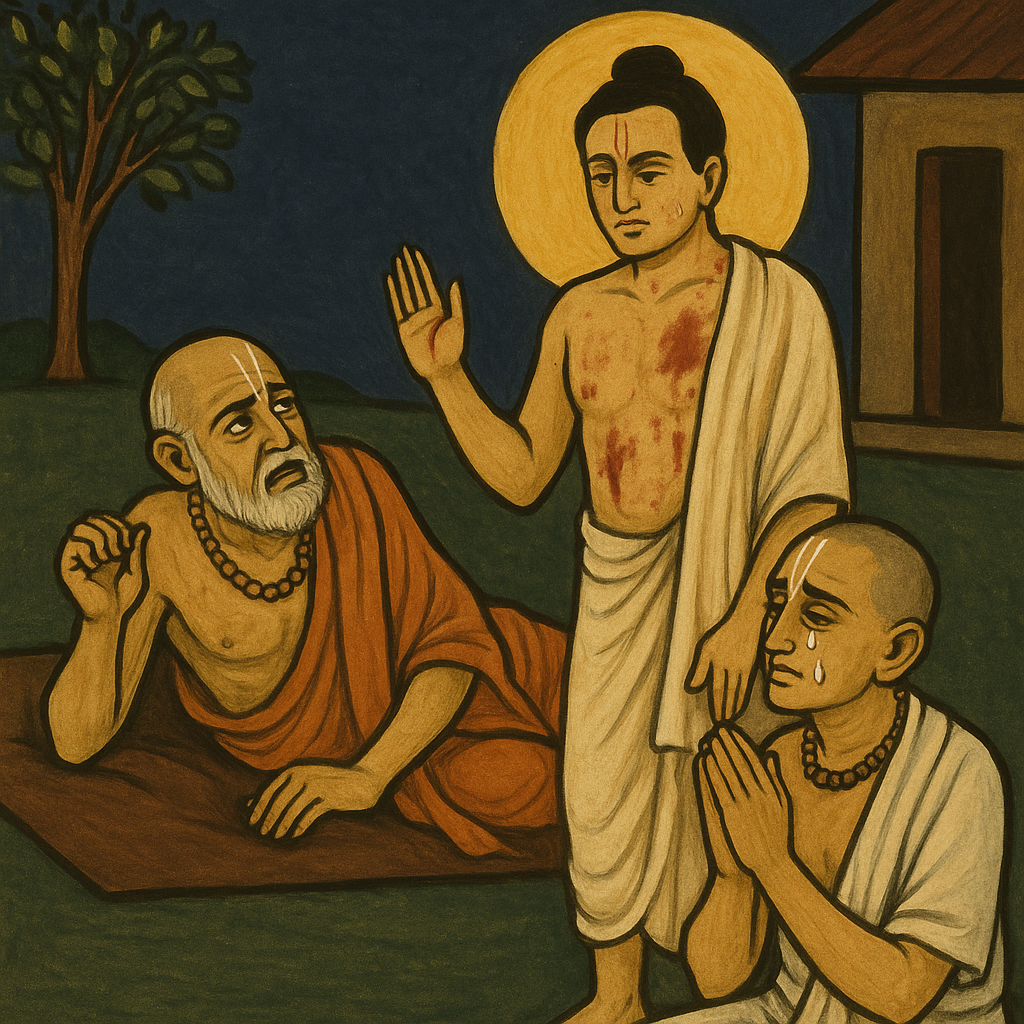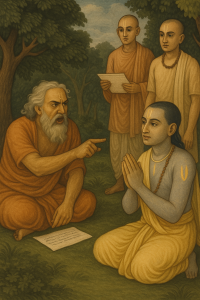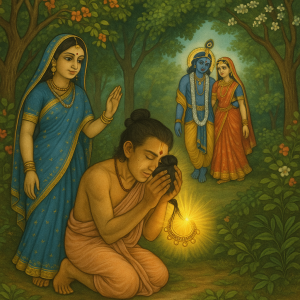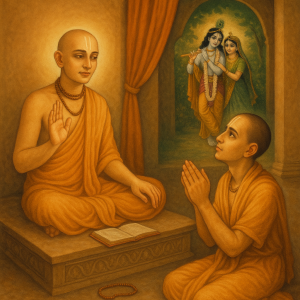(From Śyāmānanda Prakāśa – Chapter 4)
A Festival of Love Turns Sour
After Śyāmānanda’s name and tilak had been divinely affirmed, peace seemed to return. Hrdayānanda Gosvāmī, his guru, embraced him and accepted his transformation. Together with Śyāmānanda and the mahāntas, they began a grand pilgrimage to the forests and groves of Vraja, joyfully relishing kṛṣṇa-līlā.
At Sanketa, a festival of rāsa-līlā was held. There, the mahāntas watched a divine performance depicting the joyful pastimes of Śrī Rādhā and Kṛṣṇa. The sweet singing of the sakhīs, the graceful dancing, and the echo of ankle bells filled the air. The whole atmosphere was saturated with mādhurya-rasa.
Śyāmānanda, immersed in this ocean of divine love, began to roll on the ground, calling out, “Rādhe! Rādhe! Śyāma!” Uncontrollable tears streamed from his eyes. He danced, wept, and trembled, covering his head with a cloth as he surrendered to radha-bhāva—the mood of a gopī longing for Kṛṣṇa.
The festival became his altar. The emotion became his offering.
Hrdayānanda’s Misunderstanding
But not everyone understood.
Hrdayānanda Gosvāmī, seeing his disciple so absorbed in Rādhā’s mood, was disturbed. His heart was pierced:
“He is no longer worshipping Kṛṣṇa in the way I taught him. He has become a sakhī. He is lost to me now. He is not a friend of Kṛṣṇa—he is acting like a maidservant of Rādhā!”
In his confusion and pain, he quietly left the rāsa-sthalī. Bitterness fermented in his heart. Even though he had earlier accepted Śyāmānanda, now he felt betrayed.
“He has abandoned my bhāva, my mood. What is left between us?”
When the festival ended and Śyāmānanda returned to him the next morning, bowing to his feet, Hrdayānanda’s anger erupted.
The Chastisement: A Guru’s Outburst
“You have discarded Kṛṣṇa-bhāva!” Hrdayānanda snapped.
“You have become a gopī! What use is there in staying with me? Who taught you this? Gaurīdāsa Paṇḍita never worshipped this way!”
Śyāmānanda replied gently:
“Prabhu, my master Gaurīdāsa Paṇḍita worshipped both Rādhā and Kṛṣṇa. He assisted in Their meeting. He served the Divine Couple in Their confidential kuñja-līlās. I am trying to follow in his footsteps, and in yours.”
But Hrdayānanda was not convinced. Overcome with emotion, he lifted a stick and began to beat Śyāmānanda—on the hands, the back, the legs—again and again.
Śyāmānanda did not resist. He fell to the ground, bleeding and bruised, silently enduring the pain.
The Response of the Saints
The assembled mahāntas rushed forward:
“Gosvāmī! Stop! What are you doing? You had already accepted him. Why now this punishment? Have you forgotten who he is? You yourself saw the miracle of the reappearing tilak!”
But Śyāmānanda, though lying in a pool of blood, spoke with a voice full of love:
“Do not blame my guru. I am fortunate today. The cane that touched me was like candana—cooling and fragrant. His chastisement is my prasāda. Now I know he has accepted me once again. His punishment is love in disguise.”
What humility! What faith! He turned suffering into worship. He turned pain into purification.
A Dream that Shattered Pride
That night, Hrdayānanda could not sleep. A terrible uneasiness burned in his chest. Then, in the quiet of midnight, Mahāprabhu appeared to him in a dream.
The Lord’s body was covered in wounds. His white scarf was soaked in blood, and lash marks crossed His back.
Shocked and trembling, Hrdayānanda cried out:
“Prabhu! What has happened to You? Who has dared to beat You?”
Mahāprabhu looked at him with compassion and rebuke.
“It is you,” He said. “You beat Śyāmānanda—who is My very Self. Whatever blows you gave him, fell on Me. His service is non-different from Me. His tears are My tears. You have not chastised your disciple—you have hurt Me.”
Hrdayānanda fell at the Lord’s feet, weeping.
“I did not know, O Lord! Please forgive me. Let me atone. I am ready to throw myself into fire. I am a sinner. Save me!”
Mahāprabhu, with a voice full of grace, replied:
“Do not take your life. Instead, perform twelve great festivals to glorify My devotees and atone for your offense. Through this, your sin will be washed away.”
Then He touched Hrdayānanda’s head with His lotus feet and vanished.
The Dawn of Repentance
When Hrdayānanda awoke, he sat motionless, stunned by the truth. The Lord had made it clear—Śyāmānanda was not just his disciple. He was a vessel of Mahāprabhu’s own śakti.
In the morning, he gathered the mahāntas and shared the dream. With folded hands, he confessed:
“Last night the Lord came to me. My beating of Śyāmānanda fell upon Him. I have committed a grave offense—not just against a devotee, but against the Lord Himself. Please help me rectify this.”
The mahāntas replied:
“You once said dreams were illusions. But now you’ve learned—they can be revelations.”
Hrdayānanda bowed:
“Please, allow me to perform twelve festivals. Let me purify myself in the dust of Śyāmānanda’s feet.”
Then he turned to his disciple, sobbing:
“From this day, you are not my servant. You are my life. You have saved your fallen guru from sin.”
Reflections and Lessons
- Even great saints can err—but greater is the one who repents: Hrdayānanda’s humility in accepting his mistake is what made him great in the end. He did not defend his ego—he surrendered it.
- Mahāprabhu lives in His devotees: When we offend a true devotee, we wound the Lord Himself. When we serve them, we serve Kṛṣṇa directly.
- A devotee turns pain into purification: Śyāmānanda’s ability to see his guru’s beating as a blessing shows the highest maturity in bhakti. Real love does not break under trial—it deepens.
- Dreams in the life of bhakti are divine instructions: Mahāprabhu appeared not just as a vision, but as a correcting force. The dream became a turning point in the destiny of the sampradāya.
- Public atonement purifies collective karma: By organizing twelve Vaiṣṇava festivals, Hrdayānanda purified himself, inspired the community, and glorified the Lord.
Would you like me to continue next with Story 8: The Twelve Festivals in Vraja?



